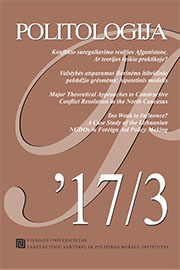Valstybės atsparumas išorinėms hibridinio pobūdžio grėsmėms: Hipotetinis modelis
National Resilience Against External Hybrid Threats: A Hypothetical Model
Author(s): Remigijus ŽilinskasSubject(s): Governance, Government/Political systems, Security and defense, Welfare systems, Present Times (2010 - today)
Published by: Vilniaus universiteto leidykla & VU Tarptautinių santykių ir politikos mokslų institutas
Summary/Abstract: Having originated from material science and ecology, the concept of resilience has recently become a fashionable topic in security studies as well. In the realm of security studies, resilience could be defined as the capability of the system or its components to withstand and keep unchanged its essential parameters in the context of permanent and longstanding internal and external risks factors or threats. National resilience is essential in ensuring the prosperous development and welfare of any nation in case of the so-called “wicked problems.” The importance of resilience was stressed during NATO’s Summit in 2016 and further promulgated by numerous academic discussions in face of Russia’s hybrid threats to the Alliance. However, the arguments were mainly focused on the broad narrative of the politico-strategic debates and on how to build resilience rather than presenting a way on how to assess and compare resilience levels in different countries. The main aim of this paper is to develop a hypothetical model of national resilience against external threats with hybrid nature (unconventional aggression) for empirical purposes in further researches. In this article, national resilience is regarded as an adaptive capacity of the government and society to retain functionality to changing external security environment. The adaptive capacity of government and society could be operationalized by different capitals, such as political leadership, economic, military, social, human, psychological etc. The specific resilience doctrines, such as functional, societal and forward were used to form the national resilience model. The articles also argues that functional resilience is less commonly used in academic debates than societal resilience. In the first part of the article, an interdisciplinary literature analysis and critical security approach was employed to reveal the complexity of the resilience concept and its possible use on system level. The second part analyzed Russia’s power projection as the main source of hybrid threats in the context of national resilience. Finally, the dilemma of good and adaptive governance in the framework of functional resilience was discussed.
Journal: Politologija
- Issue Year: 2017
- Issue No: 3 (87)
- Page Range: 45-87
- Page Count: 43
- Language: Lithuanian

